This content originally appeared on Democracy Now! and was authored by Democracy Now!.
This post was originally published on Radio Free.
This content originally appeared on Democracy Now! and was authored by Democracy Now!.
This post was originally published on Radio Free.
This content originally appeared on Democracy Now! and was authored by Democracy Now!.
This post was originally published on Radio Free.
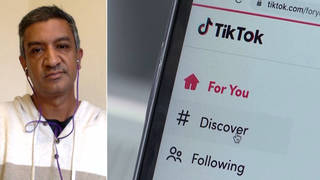
In a rare bipartisan effort, the U.S. House overwhelmingly passed a bill Wednesday requiring TikTok to be sold by its China-based owner, ByteDance, or face a ban throughout the United States. Backers claim the popular social media app could give the Chinese government access to U.S. residents’ personal data and potentially affect the 2024 elections. The fight over TikTok comes at a time of rising anti-China rhetoric in both major parties, as well as alarm among conservatives that content supportive of Palestinian rights and critical of Israel is popular with many young users of the app. The fate of the TikTok legislation now rests in the Senate, and President Joe Biden says he will sign it into law if it reaches his desk. Former President Donald Trump, who tried to crack down on TikTok while in office, now opposes the effort. “It is singling out TikTok and China without any evidence whatsoever that they are engaging in any nefarious or spying activity,” Ramesh Srinivasan, professor of information studies at UCLA, says of the legislation. “What we need is expansive, comprehensive digital rights legislation that really applies to every social media company and gives Americans power over their own data.”
This content originally appeared on Democracy Now! and was authored by Democracy Now!.
This post was originally published on Radio Free.

Journalist Mehdi Hasan warns U.S. media coverage of the 2024 election is largely unable to capture the threat to democracy posed by Donald Trump and the modern Republican Party. “We need to speak very clearly about what that fascist threat is,” says Hasan, who warns media outlets cannot “normalize his extremism and racism and bigotry,” because the right to free press itself could be under threat if he regains power. “One of our two major parties has been fully radicalized and is now in bed with white supremacists. … Let’s be plain about that.”
This content originally appeared on Democracy Now! and was authored by Democracy Now!.
This post was originally published on Radio Free.
This content originally appeared on Democracy Now! and was authored by Democracy Now!.
This post was originally published on Radio Free.
This content originally appeared on Democracy Now! and was authored by Democracy Now!.
This post was originally published on Radio Free.
This content originally appeared on Democracy Now! and was authored by Democracy Now!.
This post was originally published on Radio Free.
This content originally appeared on Democracy Now! and was authored by Democracy Now!.
This post was originally published on Radio Free.
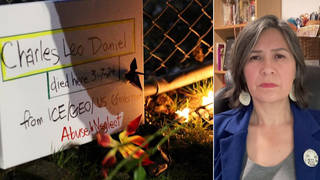
At one of the largest for-profit immigrant detention centers in the country, human rights advocates report, there were two suicide attempts Monday, just hours apart. The privately run Northwest Detention Center in Tacoma, the site of multiple hunger strikes to protest inhumane conditions over the years, also reported 61-year-old Charles Leo Daniel from Trinidad and Tobago died at the facility last week. He had been detained for about four years and was in solitary confinement at NWDC when he was found unresponsive Thursday in what is suspected to be another suicide. This all comes as a federal judge blocked Washington state from fully enforcing a law intended to increase oversight at the for-profit immigrant jail, run by GEO Group. This recent string of events reveals “the importance and the urgency to shut down the detention center now,” says La Resistencia’s Maru Mora Villalpando, who explains why immigrants are vulnerable and used for votes, for political gain and as scapegoats. “We are in this midst of horrible, horrible situations in detention centers, at the border, in the countries where people need to flee, because it’s working for corporations and for governments. … That’s why we’re not waiting for the government to solve this. We have to save ourselves.”
This content originally appeared on Democracy Now! and was authored by Democracy Now!.
This post was originally published on Radio Free.
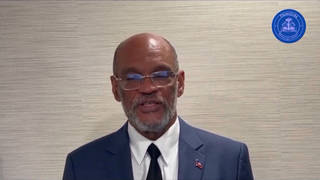
Unelected Prime Minister Ariel Henry has announced he plans to resign amid rising opposition in Haiti, where a coalition of armed groups opposing the de facto leader have declared an uprising, led mass jailbreaks and taken over the country’s airport. At an emergency meeting with international actors in Jamaica, the regional bloc CARICOM has reportedly proposed a plan to set up a seven-member presidential panel that would appoint a new interim prime minister. Barbados Prime Minister Mia Mottley said the panel would only include Haitians who support the deployment of a U.N.-backed security force, a policy supported by Henry, while large swaths of Haitians voiced opposition to another hand-selected leader. “I’m not sure this solves the problem that’s been going on in Haiti,” says Haitian American scholar Jemima Pierre, who explains why Henry’s resignation and transition announcement attempts to “put a veneer of legality on this situation,” while the country continues to operate under occupation by foreign interests. “There’s going to be more flare-ups in the next few months … if we don’t stop this problem by its root, which is the constant U.S. imposition of its terms on Haitian people and the denial of Haitian sovereignty.”
This content originally appeared on Democracy Now! and was authored by Democracy Now!.
This post was originally published on Radio Free.
This content originally appeared on Democracy Now! Audio and was authored by Democracy Now!.
This post was originally published on Radio Free.
This content originally appeared on Democracy Now! and was authored by Democracy Now!.
This post was originally published on Radio Free.
This content originally appeared on Democracy Now! for Broadcasters – HD MP4 and was authored by Democracy Now! for Broadcasters – HD MP4.
This post was originally published on Radio Free.
This content originally appeared on Democracy Now! and was authored by Democracy Now!.
This post was originally published on Radio Free.
This content originally appeared on Democracy Now! and was authored by Democracy Now!.
This post was originally published on Radio Free.
This content originally appeared on Democracy Now! and was authored by Democracy Now!.
This post was originally published on Radio Free.
This content originally appeared on Democracy Now! and was authored by Democracy Now!.
This post was originally published on Radio Free.
This content originally appeared on Democracy Now! and was authored by Democracy Now!.
This post was originally published on Radio Free.
This content originally appeared on Democracy Now! and was authored by Democracy Now!.
This post was originally published on Radio Free.
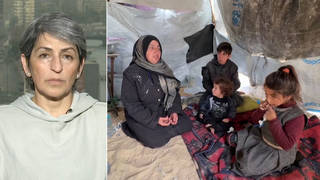
Palestinian novelist, poet and activist Susan Abulhawa recently returned from two weeks in the Gaza Strip, where she witnessed firsthand the destruction and misery wrought upon the territory and its people by Israel’s relentless assault. Abulhawa spoke with Democracy Now! last Wednesday from Cairo and said “the trauma is immeasurable” for the Palestinians in Gaza. Abulhawa describes hearing stories of abuse, humiliation and torture at the hands of Israeli soldiers as people struggle to find basic necessities to survive. “The degradation is total,” says Abulhawa. “And on top of that, they’re bombed, day in and out.”
This content originally appeared on Democracy Now! and was authored by Democracy Now!.
This post was originally published on Radio Free.
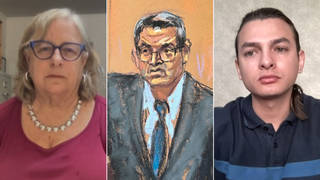
Former Honduran President Juan Orlando Hernández was found guilty of cocaine trafficking Friday after a two-week trial in a New York federal court, where prosecutors accused Hernández of ruling the Central American country as a narco-state and accepting millions of dollars in bribes from cocaine traffickers in exchange for protection. He faces a possible life sentence. Hernández served as president of Honduras from 2014 to 2022 and was a close U.S. ally despite mounting reports of human rights violations and accusations of corruption and involvement with drug smuggling during his tenure. Hernández was arrested less than a month after his term ended and was extradited to the United States in April 2022. “The majority feeling is satisfaction, a feeling of progress in achieving justice,” says activist Camilo Bermúdez from Tegucigalpa. He is a member of the Civic Council of Popular and Indigenous Organizations of Honduras, the organization founded by Berta Cáceres, the Lenca Indigenous environmental defender who was assassinated in 2016 while Juan Orlando Hernández was president. We also speak with Dana Frank, professor of history emerita at the University of California, Santa Cruz, who says the 2009 U.S.-backed coup against President Manuel Zelaya set the stage for the corrupt governments that followed. While U.S. prosecutors may have convicted Hernández, Frank stresses that multiple U.S. administrations “legitimated and celebrated him.”
This content originally appeared on Democracy Now! and was authored by Democracy Now!.
This post was originally published on Radio Free.
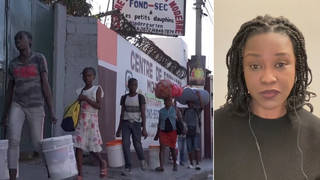
Caribbean leaders are holding an emergency meeting in Jamaica today to discuss the crisis in Haiti, where armed groups are calling for the resignation of unelected Prime Minister Ariel Henry. Haiti is under a state of emergency, with tens of thousands displaced amid the fighting, and United Nations officials warn the country’s health system is nearing collapse. Ariel Henry was appointed prime minister after the 2021 assassination of President Jovenel Moïse, but he is currently stranded outside the country after a trip to Kenya, where he was seeking a U.N.-backed security force to help him maintain power. For more, we speak with Haitian American scholar Jemima Pierre, who says the unrest in Haiti today can be traced to decisions made two decades ago by the United States and other outside powers. “The root of this crisis is not last week, it’s not this week, it’s not even Ariel Henry. But we have to go back to 2004 with the coup-d’état,” says Pierre. She adds that because successive security plans have been sanctioned by the United Nations Security Council, “the whole world is participating in the occupation of Haiti unwittingly.”
This content originally appeared on Democracy Now! and was authored by Democracy Now!.
This post was originally published on Radio Free.
Democracy Now! Monday, March 11, 2024
This content originally appeared on Democracy Now! Audio and was authored by Democracy Now!.
This post was originally published on Radio Free.
This content originally appeared on Democracy Now! and was authored by Democracy Now!.
This post was originally published on Radio Free.
This content originally appeared on Democracy Now! and was authored by Democracy Now!.
This post was originally published on Radio Free.
This content originally appeared on Democracy Now! and was authored by Democracy Now!.
This post was originally published on Radio Free.
This content originally appeared on Democracy Now! and was authored by Democracy Now!.
This post was originally published on Radio Free.
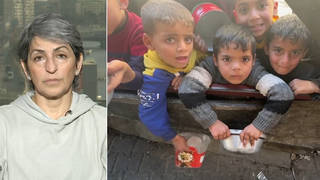
We speak with Palestinian novelist, poet and activist Susan Abulhawa, who is in Cairo and just returned from two weeks in Gaza. “What’s happening to people isn’t just this death and dismemberment and hunger. It is a total denigration of their personhood, of their whole society,” says Abulhawa. “What I witnessed personally in Rafah and some of the middle areas is incomprehensible, and I will call it a holocaust — and I don’t use that word lightly. But it is absolutely that.”
This content originally appeared on Democracy Now! and was authored by Democracy Now!.
This post was originally published on Radio Free.